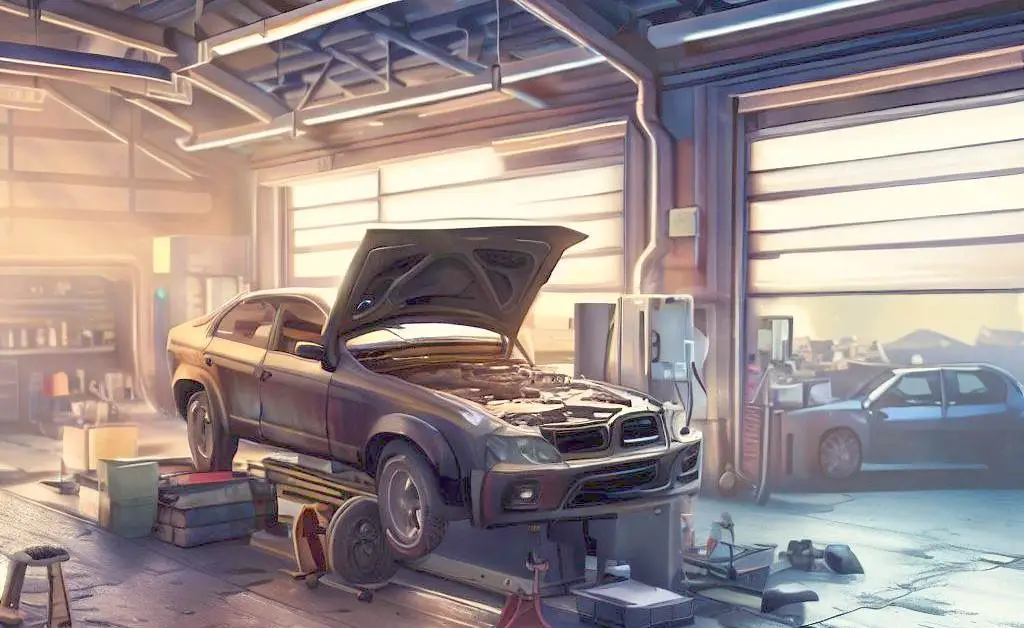9 min read
Key Takeaways
- Understanding License Requirements:
- Every mechanic business has to navigate varying state and local license requirements, from general business licenses to specialized permits for specific vehicle repair services.
- Whether limited liability or another business entity should be decided upon. Incorporating your business provides protection against personal liabilities.
- Location and Zoning Laws Matter:
- Before establishing a small business, especially an auto repair shop, it’s critical to adhere to local zoning laws, ensuring that the chosen location is legally compliant and strategically positioned for success.
- Safety, Insurance, and Continuous Learning:
- Mechanic businesses encounter hazardous materials, making safety protocols and liability insurance essential.
- Continually renewing permits and seeking industry certifications boosts credibility and ensures long-term business health.
Thinking about opening your own mechanic shop? Congratulations on taking the leap into entrepreneurship! However, before you can start accepting customers and working on their vehicles, it’s important to ensure that you have all the necessary permits and licenses in order.
Opening an automotive repair shop requires a variety of permits understanding the legal requirements is essential to avoid any potential legal issues in the future.
This will help you avoid problems and keep your business running smoothly.
In this blog post, we’ll talk about the permits you need to open an auto repair business. We’ll also cover legal regulations car mechanics must follow when running their businesses. Restoration shops in certain states should be aware of special considerations when setting up.
Obtaining Necessary Permits and Licenses for Your Mechanic Shop
Securing a Business License is Crucial for Legal Operation
Getting a mechanic shop started isn’t just about having the right tools and equipment. Auto shop owners must obtain a business license to legally operate in most states.
Zoning, licensing, and permit regulations must be adhered to in order to commence operations. It’s pivotal to understand these permits as they’re fundamental for the success of your repair business.
You may need building permits for construction, environmental approval, or zoning and land use approval. If you want to make physical changes, like adding wiring or plumbing, you need a license.
Depending on where you’re located, you might need to obtain varying permits. For example: In Vermont, auto repair facilities require various state permits, overseen by multiple departments, such as Environmental Conservation and Fire Safety. For detailed information, refer to the Vermont Small Business Fact Sheet PDF.
When starting a legal auto repair business, it’s important to register for necessary business taxes. This includes sales tax and employer payroll tax.
Auto repair facilities can pollute the air and water, so they need environmental permits. If you’re unsure about the rules in your area, take the time to understand them. This includes zoning laws and emissions regulations.
Adhering to Zoning Laws and Regulations
For a business, it’s non-negotiable to comply with zoning or land use regulations. These rules specify the permissible activities in certain zones. Non-compliance might lead to legal issues. Getting permission for signs boosts brand visibility and follows the law.
A prominently displayed company logo can foster trust and recognition among potential customers. When you maintain the same branding for a long time, it demonstrates your dedication to quality. This also indirectly supports the credibility of your services.
Equally crucial to considering the intricacies of zoning laws is the certificate of occupancy. This document verifies that the building you are considering meets the municipal building code and that the area is safe to inhabit.
It’s imperative to obtain a certificate before commencing operations, ensuring that the structure’s intended use matches the use permitted by the zoning.
Before starting, get a certificate to make sure the building’s use matches the zoning rules.
Acquiring Special Permits for Specific Vehicle Repair Services
The auto repair shop handbook/manual covers different things, like insurance for workers and safety rules for mechanics.
Mechanics need to be careful when dealing with hazardous automotive fluids like gasoline and follow proper safety protocols.
The occupational licenses required for running an auto repair business mandate certain worker protections and operating protocols. For example, the licenses cover liability insurance requirements for employees in case of injury and outline safety rules mechanics must adhere to when repairing vehicles to avoid hazards.
In some cases, you might need to register with certain bodies or the Internal Revenue Service to get an employer identification number for tax purposes, ensuring you’re fully compliant with all legal stipulations.
Taking time to learn the specific permitting rules for your area ensures your mechanic business meets all legal stipulations before servicing any vehicles.
Meeting Legal and Safety Requirements for Your Auto Repair Business
Following Proper Protocols for Hazardous Materials
When it comes to vehicle repair, there’s a requirement to meet some legal conditions so as to make sure the customers are safe and taken care of.
One very important thing when setting up a mechanic shop is getting all necessary permits sorted out. Without these papers, you may not be able to legally operate your business or even start it in the first place!
The first document that will have to be gotten is a business license from local authorities. You’ll need your application filled out plus paying for any fees involved with this procedure. Are you feeling overwhelmed yet? Don’t worry – this process isn’t too difficult, we promise!
Before starting your business, you may need extra permits for zoning or building construction. Another permit that’s essential if you plan to work with vehicles is an Automotive Repair Dealer License (ARDL). This permit allows mechanics to perform repairs and keep in line with the law related to auto repair shops. To obtain it, you need two years of automotive experience and to pass a written test from the state motor vehicle department/board. Can you tell me what kind of questions I’ll be asked?
Also, considering health and safety regulations, mechanics should secure liability insurance and possibly compensation insurance for their employees.
Maintaining Liability Insurance Coverage
Mechanics who want to work on customer cars must have liability insurance. They can get it from their employer or buy it themselves if they work independently. In most states, the coverage you need for your shop includes property damage liability and personal injury protection. This is to protect you if someone gets hurt while working on a car.
Renewing Permits and Licenses to Stay Compliant
For mechanics, continually updating your skill set and seeking industry certifications is of utmost importance. They get certified by ASE (Automotive Service Excellence) and other organizations. This shows that they meet basic requirements for car repair and maintenance, like brakes and engines. For example, some licenses may need to be renewed every two or four years.
Being certified makes customers trust them and gives them an edge over uncertified mechanics.
Setting Up Your Shop for Success
Choosing a Suitable Location for Your Mechanic Shop
You know, when you first toyed with the idea of starting a mechanic shop, your immediate thought might’ve been, “What about the zoning laws?” They’re these rules from the local government about where you can and can’t run certain types of businesses.
Before starting your mechanic shop, double-check that your proposed location complies with zoning laws and regulations. Selecting a site that violates local zoning could lead to inability to operate, legal issues, or costly delays.
- Carefully consider other key factors as well when evaluating potential locations.
- Assess traffic volume to ensure adequate customer visibility and access.
- Check for sufficient parking availability – convenience for customers is critical.
- esearch competitors in the area to avoid oversaturation.
Thoroughly investigating things like zoning compliance, parking, traffic, signage visibility, competing shops, and referral opportunities can provide insights into the viability of a site.
Take time to understand the advantages and disadvantages of different locations before signing a lease. An informed choice maximizes the likelihood of establishing a thriving auto repair business.
Hiring Certified and Skilled Auto Mechanics
Once you’ve found the perfect spot for your mechanic shop and met all the legal requirements, it’s time to set up how this business will run.
To make sure everything runs smoothly, you need skilled mechanics who do good work at fair prices. Get references from their previous and run background checks. This will ensure you are hiring competent and expert workers.
It’s important to have customer service policies and safety protocols in place. You should also have a system for invoicing.
It takes each of these steps to come together perfectly for a successful mechanic shop launch – so take your time as you go through this part!
Stocking Your Shop With Necessary Tools and Parts
When setting up your auto shop, make sure to have a comprehensive selection of automotive tools and parts to handle a wide range of repairs.
Begin by identifying the most common services you expect to provide, such as brake, transmission, engine, and electrical system repairs. Research which specific tools and diagnostic equipment will be needed for these jobs. Invest in premium-grade tools and lifts from reputable brands to ensure durability.
It’s also crucial to stock up on frequently used parts like brake pads, rotors, belts, hoses, filters, fluids, fuses, bulbs, spark plugs, and tires. Organize inventory clearly and track usage to optimize reorders.
Additionally, keep a range of hardware like bolts, screws, connectors, and wiring on hand. Maintain stock of cleaners, lubricants, sealants, and other maintenance products as well.
When deciding what inventory to keep, think about the types of cars you work on and make sure you have the right replacement parts. Cross-reference parts diagrams and VIN-specific catalogs as needed.
Stay up to date on new automotive technologies and components to serve customers with newer vehicles. Routinely audit and expand your parts selection to align with demand. With the right tools and parts in stock, your shop can deliver efficient, high-quality repairs.
Wrapping Up
To summarize, starting an auto repair shop requires thorough research and preparation.
Before you kick things off, it’s essential to connect with the small business office in your state. Business tax registration with the Department of Revenue is a must.
Those looking to work as a mechanic must also consider the type of mechanic specialization they want to pursue. Ensure they have the proof of certification necessary. It’s not just about having the skill; licenses are an important validation of one’s expertise in repair and maintenance.
Starting a business can be daunting, but with due diligence in obtaining the necessary permits and ensuring your shop meets state and federal requirements.
References:



